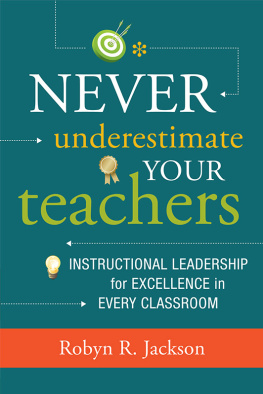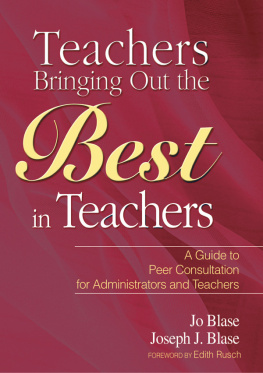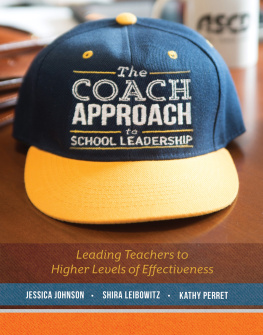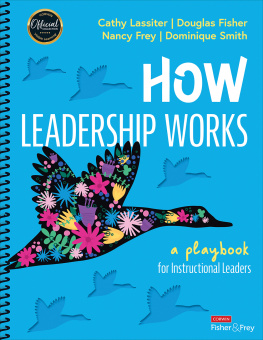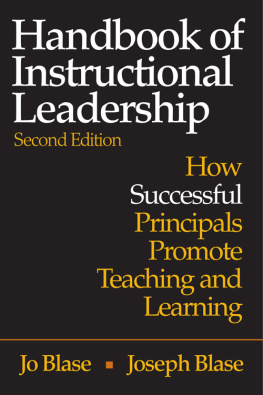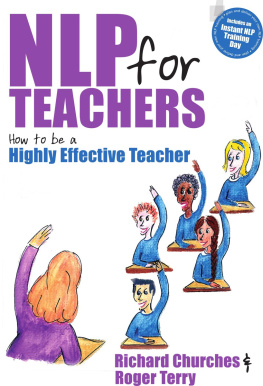Contents
Guide
Pages
Dedication
....................
To Sheri, who is still very much the boss of me.
Acknowledgments
....................
It is fitting to start a book on leadership by thanking the people who have faithfully provided leadership to me.
I have been blessed to know and be close to my grandparents well into adulthood. I am so grateful to have had the chance to learn from John F. Jackson II, Grace Kilby Jackson, Robert T. Colbert, and Dorothy Colbert. I miss them very much.
I thank God daily for my parents. I happen to have two of the best parents anyone could have. They taught me to be the leader that I am, and I value their loving guidance. I am blessed to have shared my parents with an amazing sister. I don't exaggerate when I say that she truly encompasses all that is good and right and wise in the world. My family keeps me anchored and makes it possible for me to do all that I do. I wouldn't be me without them.
Beyond my family, I've been blessed to be surrounded by some really smart people. I am grateful to the Mindsteps leadership team that has taught me so much about great teaching and instructional leadership. I continue to learn from Sharon Fogler, Dianne Hamilton, Beverly Brandon-Simms, Robin Kinney, John Jackson, Valda Valbrun, Jo-Jo Jackson, and Sheri Jackson. I am also indebted to my personal group of mastermindsDiane MacEachern, Lynn Miller, Betsy Garside, and Perry Pigeon Hookswho continue to push and inspire me, and to Doug Shiffman, who keeps me focused on what's important. This book would not be what it is without the leadership of Genny Ostertag and Katie Martin, my editors at ASCD. I love working with them.
Finally, I want to thank Charles D. Brooks II, to whose careful and loving leadership I gladly submit. I'd follow him anywhere.
Introduction: Any Teacher?
....................
If we truly believe that all children can learn, then we must believe that all educators can learn, even in the face of contrary evidence.
Roland S. Barth, On Common Ground
My conviction that any teacher can become a master teacher tends to provoke certain reactions. Some people smile indulgently and murmur something about the naivet of youth. "You'll learn," they say. Others are taken aback by the boldness of the statement. "Any teacher?" they ask incredulously, while shaking their heads. "You haven't met some of the teachers in my building." Still others eye me suspiciously, as if I am some sort of huckster offering them a sip of snake oil to wash down a handful of magic beans.
Even those who agree with me in principle want to revise the statement. "I'd say most teachers," they say cautiously. "Not every teacher is going to become a master teacher."
This is the perspective that defines much of the professional development for educational leaders. It's why we focus more on helping teachers fix aspects of practice than on helping them pursue limitless excellence. It explains why entire curricula and school programs have been built on the idea that student achievement can somehow be teacher-proofed. And this habit of underestimating our teachers is what drives so many administrators and reformers to spend more time talking about getting rid of bad teachers than they do about transforming them into good ones. It seems that while we gladly embrace the idea that all children can learn successfully, we do not extend the same idealism to our colleagues. Any child can learn, but the adults? Well, that's another story.
The tendency is to separate teachers into two categories: the silk purses and the sow's ears. Although we acknowledge that a silk purse may occasionally turn out to be a sow's ear, rarely does it happen the other way around. It's as if we believe that teaching skill is a static gift: everyone is born with a certain amount, and it can't be taught. But this idea creates a bizarre schism. The foundation of our work as educators is that we believe in the human potential to learn, to get better, to grow. Why do we embrace that fundamental belief when it comes to our students and yet reject it as unrealistic when it comes to our colleagues?
Maybe it's because, in the experience of most of us, the really great teachers are a rare breed. Saying that any teacher can become a master teacher seems to sully the idea of masterful teaching, making it, well, common. And yet, shouldn't masterful teaching be common? Shouldn't every student have the benefit of a master teacher?
Why Master Teachers?
While we're asking questions, why are master teachers so important, anyway? Does everyone have to be exceptional? Won't a pretty good teacher or even a not-so-bad teacher do?
These are legitimate questions, and in order to answer them we must look at what we mean when we say "master teacher." The quickest definition is that a master teacher is one who helps every student in the classroom meet or exceed the standards. Every student. The master teacher's approach to teaching is seamless. Master teachers seem to instinctively know what to do to help each child learn. They have a large repertoire of skills, and they know when and how to deploy these skills to best help their students.
Master teachers consistently get at least a year's worth of growth out of a year's worth of school; some researchers even argue that master teachers can help students make twice as much progress as an average teacher can (Hanushek, 2004). With an average teacher, a student who begins the year reading at a 3rd grade level might end the year reading at an early 4th grade level. Not badand certainly preferable to spending the year with an ineffective teacher and finishing the year still reading at a 3rd grade level. But put that student in a master teacher's class, and by the end of the year, he will be reading at a late 4th grade level and possibly at a 5th grade level. Over time, having a master teacher can make up for disadvantages such as family background and poor early educational experiences. In fact, a student who has a master teacher five years in a row prior to 7th grade can overcome the average mathematics achievement gap that exists between lower- and higher-income students.
So, given the difference masterful teaching makes in students' learning, I'll ask again: Why shouldn't masterful teaching be the goalthe attainable goalof every teacher in the profession? And why shouldn't promoting masterful teaching be a goal of every school leader? It should be, and it could be. And the very first step is to stop underestimating our teachers. Great instructional leadership means rejecting the idea of masterful teaching as a gift endowed to a select few. It means seeing masterful teaching for what it really is: a combination of skills and attitudes that can be learned and that can be taught.
The Test of Leadership
Leadership is not so much getting people to follow you as it is working through other people to accomplish the vision and goals of the institution. Just as teachers might be judged by how well they handle their most challenging students, we school leaders can be judged by how we handle our most challenging teachers. It is easy to lead those who want to be led, but being able to lead those who initially resist? That's the ultimate test of leadership.
I learned this lesson the hard way (ironically enough, as I was writing this book). Some things to know about me: I was a pretty good middle school administrator. I have coached hundreds of principals, assistant principals, headmasters, deans, and central office administrators on how to help any teacher become a master teacher. I have written a book (Jackson, 2008) that provides step-by-step guidance on how to have difficult conversations with teachers. And I regularly give speeches on the topic, write articles, and offer advice to administrators who are frustrated and down to their last straw. It would be reasonable to think that I would know exactly what to do if my own leadership were tested, right?

